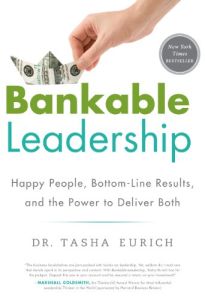Únase a getAbstract para acceder al resumen.

Únase a getAbstract para acceder al resumen.
Dr. Tasha Eurich
Bankable Leadership
Happy People, Bottom-Line Results, and the Power to Deliver Both
Greenleaf Book Group, 2013
¿De qué se trata?
Leadership skills you can use to “deliver results that your company can take straight to the bank.”
Recommendation
Leaders think they must either be warm and fuzzy so employees like them, or ruthless and driven so employees fear them. Performance suffers when leaders worry more about losing friendships than achieving results. Conversely, leaders who focus solely on the bottom line cause low morale, employee burnout and high turnover. Dr. Tasha Eurich, an organizational psychologist, shows leaders how to balance the needs of their people with company performance goals and how to “be human and drive performance, be helpful and drive responsibility, be thankful and drive improvement,” and “be happy and drive productivity.” Eurich deliberately treads quite familiar territory, but she provides quite useful advice on being a more effective, “bankable leader.” getAbstract recommends her guidance to anyone, at whatever level, who supervises others.
Summary
About the Author
Organizational psychologist Tasha Eurich, known as “Dr. T” to her clients, is a consultant in leadership and team training. An instructor at the Center for Creative Leadership, she speaks often at the MBA programs at the University of Denver and Colorado State University.























Comment on this summary